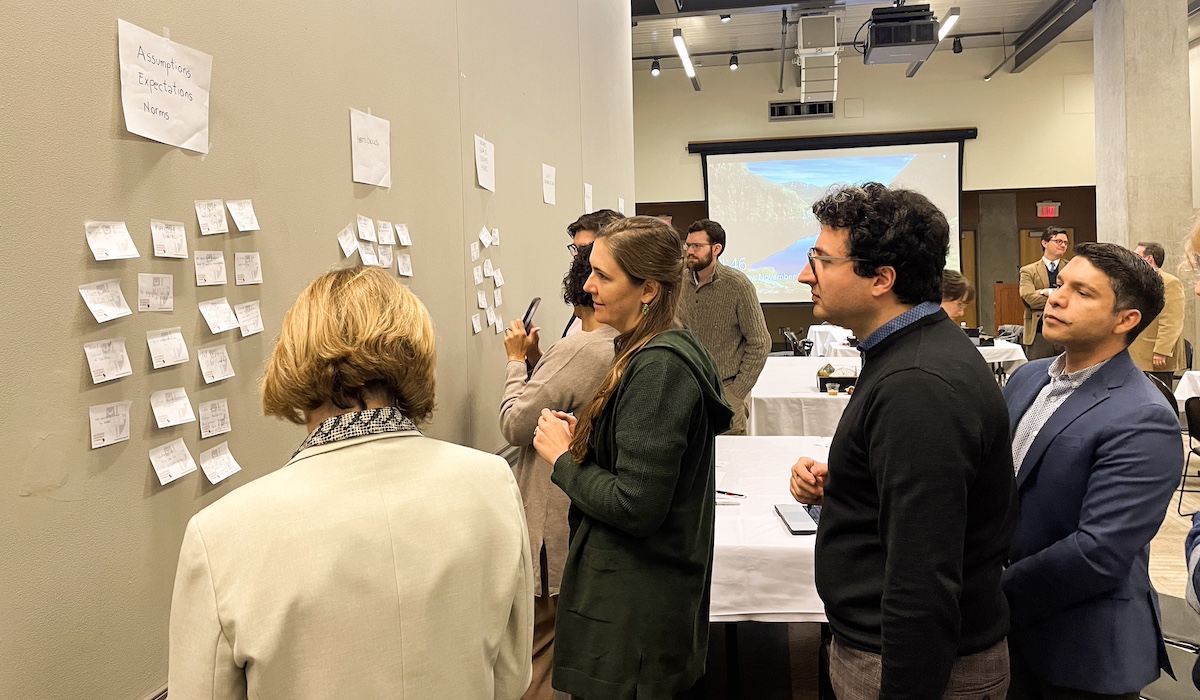
With representation from several departments including Nursing, Architecture, Education, English, Marketing, Early Christian Studies, Politics, Library and Information Science, Business, History, Philosophy, and Greek and Latin Studies, faculty gathered in Great Room C of the Edward J. Pryzbyla University Center on November 8th, 2023, for “Mitigation and Enrichment: What do we now?” The workshop serves as the third installment of the Artificial Intelligence Workshops facilitated by CTE Faculty Fellows Dr. Jonathan Askonas and Dr. Justin Litke from the Department of Politics.
The Evolution of Text and Reading Behavior
Dr. Askonas began the workshop by sharing how the readings provided – Ivan Illich’s In the Vineyard of the Text (1993) and Reading As Counter-Practice by L.M. Sacasas (2022) – illustrate the shift over time in printed text and the way we interact with text. As access to text became increasingly available, the way we needed to access it changed, according to Sacasas, and now, we may not even read for the reasons we once did. One reason we read now is to counter the digitization we now live with, and our behaviors can be viewed as coping mechanisms. Sacasas suggests that it may be best for us to read fewer things well.
Acknowledging the reading behavior of students, Dr. Askonas guided the group through two brainstorming exercises to further examine the shift taking place–including how the shift is impacting students and what strategies might help in responding to this shift.
How Digitization Is Shaping Students
Assumptions, Expectations, and Norms
For many students today, their experience with text has primarily been digital. As a result, it is assumed that everything is digital, and information exists and is accessible solely online. Therefore, technology does the work for them and makes things easier. This has also changed the way students approach learning. Now, being able to access and possess information (by downloading) is considered learning rather than going through the process of learning.
Habits and Skills
Growing up with technology has made it easy for students to adapt to new technology. This has led to increased reliance on technology. Scrolling and skimming have become common practice while the development of handwriting and spelling skills has declined, along with deep reading. And although individual creativity has increased, there is greater reliance on collaboration and teams. Technology comes first, making it the go-to for everything from communication to navigation and research.
Desires, Goals, Dreams, and Fears
With getting a job to have a good life at the center, students are concerned about potential job replacement and faculty not keeping up with technology. While there is the question of what the good life actually promises, the desire remains to make an impact on society and advance opportunities for marginalized groups. Perhaps more importantly, work/life balance is desired, as previous generations have yet to achieve this.
Approaches to Achieving Undergraduate Curriculum Goals and Outcomes in the Age of Digitization
As an introduction to the second exercise, Dr. Askonas shared Catholic University’s Goals and Outcomes for Undergraduate Curriculum. He asked participants to review the knowledge, skills, and character students are expected to develop as a result of engaging with the curriculum, which includes a spirit of inquiry, working to advance the common good, and striving for and exhibiting excellence.
Reflecting on the goals and outcomes, participants were asked to think about how teaching outcomes and assessment should be approached in order to achieve the goals and outcomes set forth by the University, in this age of digitization.
Teaching Goals and Outcomes
Faculty recognize this time as an opportunity to adjust to the integration of AI and all it may present–for themselves and for students. There will be a delicate balance between helping students recognize the importance of knowledge, as well as helping students appreciate the process of acquiring knowledge. For example, students may hold a particular view of AI and how they will work with it, but they need to understand that knowledge is needed in order to work with it. And if faculty can look for ways to cultivate curiosity, students may actively contribute and become more engaged with how to approach various situations.
Assessment
In the age of AI, oral delivery and assessment, in-person, may become more important replacing written, out of class assignments. Faculty were encouraged to opt for more dynamic, varied, and differentiated approaches to assessment, utilizing questions that form critical thinking patterns and activities involving evaluation and critique. And, when integrating AI, faculty stood in the inquiry of whether to assess student development on their knowledge or the ability to use AI.
Conclusion
While faculty may find this time as an opportunity to determine how to counter or integrate practice in response to what is taking place, by taking the time to engage in conversations like this, they demonstrate their commitment to shaping the type of student the University hopes to foster through the undergraduate curriculum, in this age of digitization. It is important that faculty continue these efforts to be reflective and intentional about their pedagogical practices. And perhaps in the same way students might be encouraged to appreciate the process of learning, faculty might be encouraged to appreciate this process.
CTE offers several ways for faculty to reflect on their practice. Here’s a recording from the virtual session on November 16th:
References
Illich, I. (1993). In the vineyard of the text: A commentary to Hugh's didascalicon. University of Chicago Press. (CUA Library Permalink)
Sacasas, L.M. (2022). Reading as counter-practice. The Convivial Society, 3(19). https://theconvivialsociety.substack.com/p/reading-as-counter-practice
__________
Trish Wedderburn, M.A. is an instructional designer at CTE. Her work has included student and academic development, course and curriculum design, and faculty development in higher education for more than a decade.
